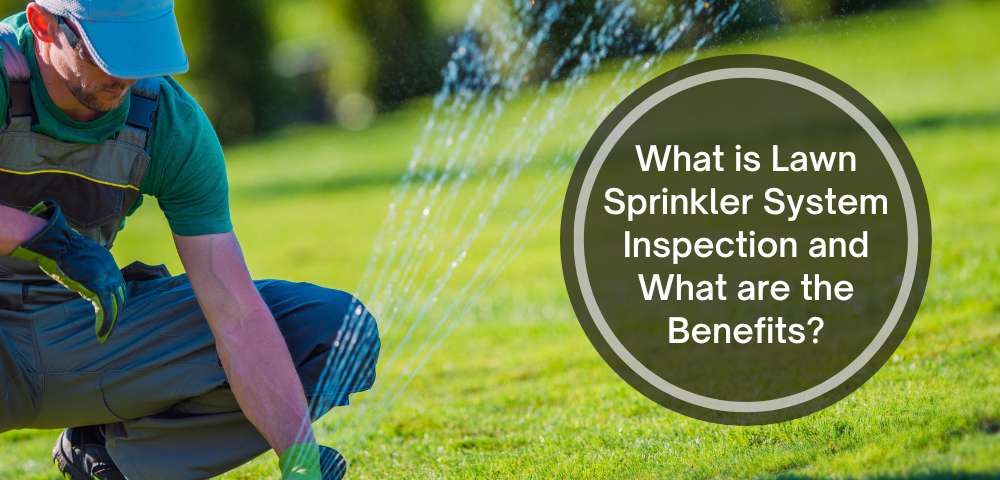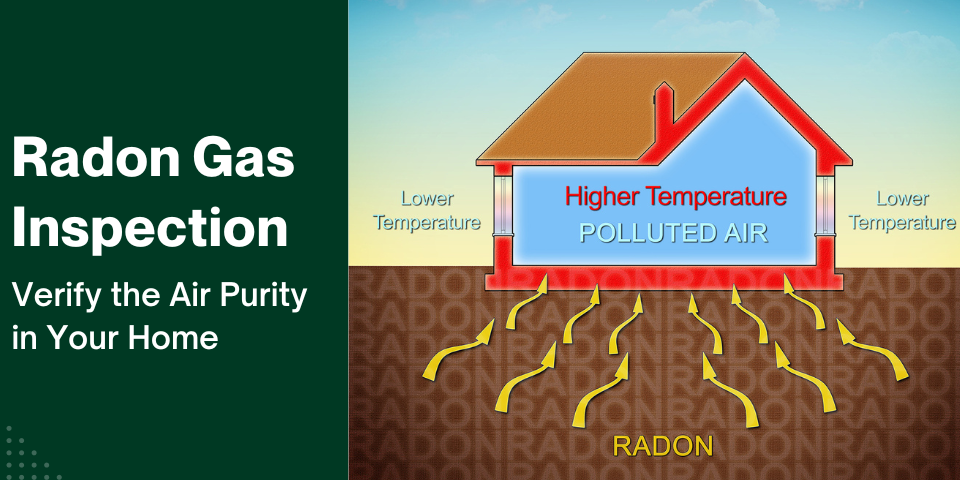What is Lawn Sprinkler System Inspection and What are the Benefits?

Radon Gas Inspection – Verify the Air Purity in Your Home
March 16, 2023A lawn sprinkler system is an essential component of maintaining a healthy, lush, and green lawn. It ensures that your grass, plants, and other vegetation receive the right amount of water at the right time. However, like any other system, lawn sprinklers require regular maintenance and inspection to function optimally. A lawn sprinkler system inspection involves a thorough evaluation of the sprinkler system to identify any issues, inefficiencies, or areas for improvement. The benefits of a regular lawn irrigation inspection include:
- Saving water and money: By identifying and fixing inefficiencies and leaks, you can conserve water and reduce your water bill.
- Protecting your investment: Well-maintained sprinkler systems can increase your property value and maintain your landscaping's overall aesthetics.
- Preventing damage: Regular inspections can identify issues before they become severe, preventing costly repairs and damage to your lawn.
- Ensuring optimal performance: Properly maintained sprinkler systems deliver the right amount of water to your lawn, preventing over-watering or under-watering.
How to Perform a Pre-Inspection of Your Lawn Sprinkler System
Before scheduling a professional lawn sprinkler inspection, it's helpful to conduct a pre-inspection of your lawn sprinkler system. This process helps you identify any apparent issues and improve the system's overall performance. Here's how to perform a pre-inspection:
- Visually inspect the sprinkler heads: Walk around your yard and examine each sprinkler head for visible damage, such as cracks or leaks. Make sure the heads are properly aligned and not obstructed by grass, plants, or debris.
- Test the system: Turn on each zone of your sprinkler system and observe the water distribution. Check for any irregularities, such as uneven coverage, puddling, or pressure inconsistencies.
- Check the control panel: Ensure that the control panel is functioning correctly and programmed with the appropriate settings for your lawn's watering needs.
- Inspect the backflow preventer: The backflow preventer prevents contaminated water from flowing back into your home's water supply. Make sure it is in good condition and functioning correctly.
- Note any issues: Document any problems you find during your pre-inspection. This information will be helpful when discussing your system with a professional inspector.
5 Tips to Improve Your Lawn Sprinkler System Performance & Efficiency
- Adjust the sprinkler heads: Ensure that the sprinkler heads are aligned correctly, and the spray patterns cover the desired area without wasting water on sidewalks or driveways.
- Install a rain sensor: A rain sensor can prevent unnecessary watering by detecting rainfall and pausing the sprinkler system until your lawn requires additional water.
- Use a smart controller: A smart irrigation controller can automatically adjust your watering schedule based on weather conditions and your lawn's specific needs, improving overall efficiency.
- Schedule watering during optimal times: Water your lawn during the early morning or late evening when temperatures are cooler, and evaporation rates are lower.
- Regularly inspect and maintain the system: Perform routine checks and address any issues promptly to keep your sprinkler system operating efficiently.
What Issues Should You Look Out For During a Lawn Sprinkler Inspection?
During a lawn sprinkler inspection, watch out for the following common issues:
- Broken or damaged sprinkler heads
- Leaks in pipes or connections
- Clogged or obstructed sprinkler heads
- Inefficient watering patterns or overlap
- Incorrectly programmed controller settings
- Malfunctioning rain sensor or backflow preventer
- Low water pressure or uneven pressure across zones
Best Practices for Ensuring a Successful Lawn Sprinkler Inspection
To ensure a successful lawn irrigation inspection, follow these best practices:
- Hire a professional inspector: While a pre-inspection can help identify apparent issues, a professional inspector has the expertise and tools to thoroughly assess your sprinkler system's performance and efficiency. They can pinpoint problems you might have missed and provide recommendations for improvements.
- Schedule regular inspections: Don't wait for issues to become severe before scheduling an inspection. Regular inspections can catch problems early, saving you time, money, and water in the long run. Aim to have your sprinkler system inspected at least once a year or as recommended by your inspector.
- Keep a maintenance log: Document all inspections, repairs, and maintenance activities for your sprinkler system. This log will help you track your system's performance and provide valuable information for future inspections and repairs.
- Be proactive with repairs: If your inspection reveals any issues, address them promptly. Delaying repairs can lead to more significant problems, increased water waste, and potential damage to your lawn and landscaping.
- Monitor your water usage: Keep an eye on your water bill and look for any unexpected increases in usage. This can be an early warning sign of leaks or inefficiencies in your sprinkler system that may require attention.
- Stay informed about local watering restrictions: Be aware of any local watering restrictions or guidelines, and ensure your sprinkler system is in compliance. This can help you avoid fines and conserve water in your community.
- Educate yourself about your sprinkler system: Understanding the basics of your lawn sprinkler system can help you identify issues and communicate more effectively with your inspector. Familiarize yourself with the different components, such as sprinkler heads, pipes, valves, and the control panel.
- Maintain your landscape: Proper landscape maintenance can help your sprinkler system function more efficiently. Trim grass and plants regularly to prevent obstructions and ensure even water distribution. Additionally, be mindful of the placement of new plants or landscaping elements, as they can impact your sprinkler system's performance.
A well-maintained lawn sprinkler system is crucial for keeping your lawn healthy and attractive. By performing regular inspections and addressing any issues promptly, you can ensure your sprinkler system operates efficiently, conserves water, and saves you money in the long run.
Preparing for a lawn irrigation inspection involves conducting a pre-inspection, being proactive with repairs, and following best practices to optimize your system's performance. Additionally, hiring a professional inspector and scheduling regular inspections can help you avoid common pitfalls and maintain a reliable sprinkler system for years to come.




